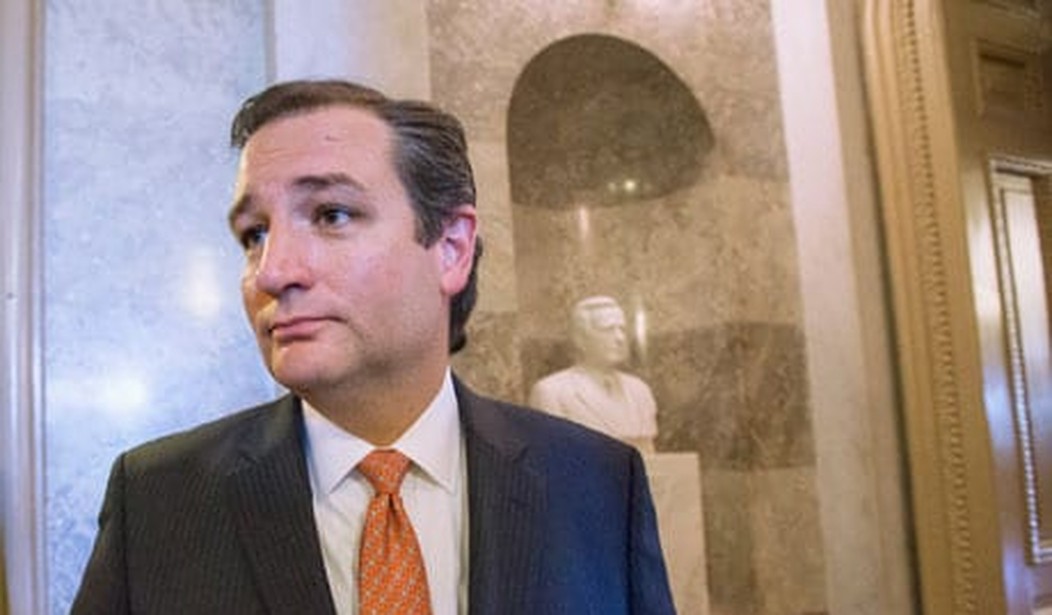WASHINGTON – The Senate finally adopted an increase in the nation’s debt limit after a prolonged vote on Wednesday when a reluctant Republican leadership sided with Democrats to spoil a potential GOP filibuster.
Sen. Ted Cruz (R-Texas) imposed a Senate rule that forced proponents to round up 60 votes before a final vote on raising the debt limit through March 15, 2015, could be conducted – a significant hurdle since majority Democrats, all of whom favored passage, control only 55 seats.
For a while it appeared Cruz and his supporters might prevail, leading to what many fear could be nasty economic consequences. But Senate Democratic Leader Harry Reid, of Nevada, kept the vote tally open for more than an hour before Senate Republican Leader Mitch McConnell, of Kentucky, who spent some time loitering on the Senate floor with GOP supporters, gathered enough support to permit the legislation to proceed.
Cruz’s effort to block a vote failed 67-31, with 12 Republicans siding with Democrats. With the way cleared, the final vote to raise the debt limit, currently set at $17.2 trillion, was 55-43 primarily along party lines.
“I’m glad that Republican leaders finally bowed to reality and put families and the economy before the Tea Party,” said Sen. Patty Murray (D-Wash.), chairwoman of the Senate Budget Committee. “The era of economic hostage-taking, ransom demands, and manufactured crises should finally be behind us, and we now have an opportunity to refocus on the real challenges workers and families face every day.”
Cruz, meanwhile, was unapologetic about his filibuster effort, asserting that the vote proves that neither party is listening to the American people.
“Some members of Congress care so much about being praised by the Washington media that they’re willing to mortgage our children’s future,” Cruz said. “They pretend we don’t have a problem and can just kick the can down the road. Let’s be clear about the motive behind this vote — there are too many members of Congress who think they can fool people and they will forget about it the next week. But sometimes, come November, the people remember.”
Reid, however, expressed satisfaction with the outcome, noting that economists have warned that failure to raise the debt limit, thus leading to the federal government defaulting on its bills, could “devastate the economy and erase the past five years of recovery.”
A report issued by the nonpartisan Peterson Institute for International Economics found that the economy lost $150 billion in productivity and 750,000 jobs when Congress went to the edge of defaulting two years ago before raising the debt limit. Reid said financial industry leaders warned that even the threat of default ripples quickly through the economy.
“And I am hopeful that a more bipartisan, common-sense approach – one that favors collaboration over hostage taking – will prevail this year,” Reid said. “Congress should be striding from accomplishment to accomplishment, not staggering from crisis to crisis. If we spent more time working together and less time running out the clock on procedural hurdles and Republican filibusters we might actually get things done around here. I hope we can continue to cooperate and collaborate this year, and to deliver results for Americans looking for action instead of gridlock.”
Most Republicans opposed the debt limit hike out of concern that it could lead to more federal spending and thus increase the deficit.
“We need some reform before we raise the debt ceiling,” said Sen. Jeff Sessions, (R-Ala.), ranking member on the Senate Budget Committee. “We need to demonstrate that we are taking steps that will reduce the accumulation of debt in the future. And the president and the Democratic Senate have just flatly refused. So they’ve just said, ‘We’ll accept no restraint on spending’.”
Drama has followed the effort to raise the debt ceiling this week. Treasury Secretary Jack Lew warned lawmakers that the ceiling would be reached on Feb. 27 unless Congress acted despite extraordinary measures. Lew said the federal government would be left with “only the cash on hand and any incoming revenue to meet our country’s commitments” unless borrowing authority increased.
House Speaker John Boehner (R-Ohio) tried to arrange legislation that would promote GOP priorities along with the debt limit increase but the effort failed within his own caucus – too many proved unwilling to vote for a hike in any form. The Speaker finally ditched his plan and decided to proceed with a “clean” debt limit bill – with no amendments – to draw Democratic votes.
That ploy succeeded despite criticism from conservative groups.
McConnell has said for months that previous efforts to force concessions from the Obama administration and Senate Democrats had failed and that he intended to make sure the nation didn’t default on its obligations. That vow proved successful only after McConnell, joined by Senate Minority Whip John Cornyn, of Texas, stepped forward to make their preferences known. After that, several GOP lawmakers changed their cloture votes in a display of support for the leadership.
Other Republicans voting in favor of letting the bill proceed to a final vote were Sens. Lisa Murkowski (Alaska), Jeff Flake (Ariz.), John McCain (Ariz.), Mark Kirk (Ill.), Susan Collins (Maine), Mike Johanns (Neb.), Bob Corker (Tenn.), and Orrin Hatch (Utah), John Barrasso (Wyo.) and John Thune (S.D.).
The bill now goes to President Obama, who is anxious to sign it.
“I’m pleased that Republicans and Democrats in Congress have come together to pay for what they’ve already spent, and remove the threat of default from our economy once and for all,” Obama said in a statement. “The full faith and credit of the United States is too important to use as leverage or a tool for extortion. Hopefully, this puts an end to politics by brinksmanship and allows us to move forward to do more to create good jobs and strengthen the economy.”
“Instead of wasting time creating new crises, Congress should be focused on creating new jobs and opportunities,” he added. “That’s what the American people deserve from their representatives in Washington, and that’s what they should get.”









Join the conversation as a VIP Member